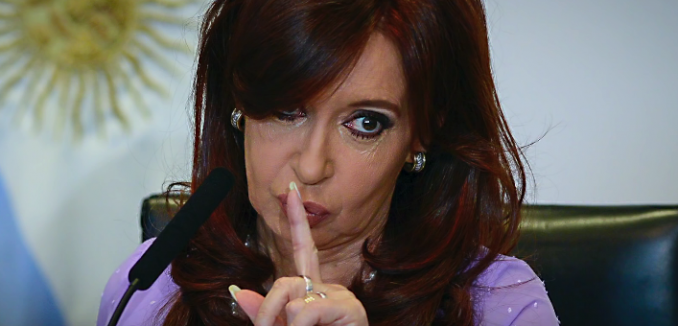Argentine President Cristina Fernández de Kirchner allegedly received bribes from the Iranian regime as part of her negotiations to absolve the Islamic Republic of responsibility for the July 1994 bombing of the AMIA Jewish Center in Buenos Aires, in which 85 people were murdered and more than 100 wounded. The claim against Fernández de Kirchner is featured in a powerful new documentary about the suspicious January 2015 death of Alberto Nisman, the federal prosecutor who had spent over a decade investigating the AMIA atrocity.
According to local journalists and other experts interviewed in Los Abandonados (The Abandoned), the just-released documentary by writer and director Matthew Taylor, Fernández de Kirchner was persuaded by the late Venezuelan dictator, Hugo Chavez, to radically depart from the policy of her predecessor and husband, Nestor Kirchner, who sought the arrest and trial of senior Iranian and Hezbollah officials for the bombing. “I think she considered Hugo Chavez to be her political and ideological guide,” says Ceferino Reato, editor of the magazine Fortuna, in the film.
Fernández de Kirchner is said to have been influenced by Chavez to divert the AMIA investigation away from the Iranians. One interviewee in the film quoted a Venezuelan intelligence officer who claimed that Iran had made a payment, through the Venezuelan regime, of $800,000 towards Fernández de Kirchner’s presidential campaign. Under Chavez and his successor, Nicolas Maduro, Venezuela has emerged as Iran’s chief ally in Latin America.
The film painstakingly traces the evolution of the AMIA investigation from that fateful day in 1994, pointing out that the focus on Iran was pushed heavily by both Nestor Kirchner and Jaime Stiuso, the former Argentine intelligence chief who became a key ally for Nisman in his investigation. Many of those interviewed in the film described Nisman as a brave and persistent investigator who did not cease his efforts even after Iran issued a fatwa – effectively a death warrant – against him in 2007.
“Los Abandonados” underlines that Nisman’s main achievement was getting Interpol to release “red notices,” or international arrest warrants, for five of the officials wanted in connection with the bombing. Among them was Mohsen Rabbani, the then Iranian cultural attache in Buenos Aires. The fact that Interpol took the dramatic step of issuing the red notices, said Miguel Angel Toma, a former director of Argentina’s intelligence agency, proved “that the evidence that was presented by Nisman was sustainable enough to be accepted.”
Under the sway of Chavez and a coterie of pro-Iranian officials around her, Fernández de Kirchner began the process of reconciliation with Iran. According to Patricia Bullrich, a member of the Argentine Congress, this shift was made painfully apparent in 2012, when the Argentine ambassador to the UN in New York remained respectfully seated while Iran’s Holocaust-denying President Mahmoud Ahmadinejad delivered a speech to the General Assembly. In previous years, Bullrich added, the Argentine delegation had walked out when Ahmadinejad approached the rostrum.
By February 2013, Argentina and Iran had reached a mutual understanding that exonerated Iran of its culpability for the AMIA attack. Compared by one interviewee to an American president declaring from the steps of the Capitol that al-Qaeda was not responsible for the 9/11 attacks, the agreement between the two countries meant that Interpol’s red notices were no longer in the frame. Practical benefits for both countries included an oil-for-grain deal, which came as Argentina was experiencing an energy crisis. (According to Fernández de Kirchner, speaking at the UN last week, the Obama administration also tried in 2010 to convince Argentina to provide Iran with nuclear fuel.)
Taylor’s film makes extensive use of the authorized wiretaps that Nisman used in uncovering Iran’s relations with key personnel around Fernández de Kirchner. One critical conversation, as documented by The Tower Magazine contributor Eamonn MacDonagh in a July 2015 article, and also featured in the film, took place in September 2013 between Kirchner confidantes Luis D’Elía and Yussuf Khalil. The exchange underlines the urgency with which the agreement with Iran was being pursued:
D’Elía: Yusuf.
Khalil: How’s it going?
D’Elía: Fine, I have an urgent message from the Argentine government. To pass over there [to Iran], it’s totally urgent, before tomorrow.
Khalil: Before tomorrow? Where are you?
D’Elía: In Government House.
Khalil: Okay, I am headed in that direction.
D’Elía: Listen to me, let’s go to the Embassy [of Iran]. Why don’t we meet there at 12.30? […] I called a while ago, he [the Iranian Chargé d’Affaires ] is in a meeting. But let’s deal with this, there is no subject more important than this.
“This” was a reference to the AMIA investigation. Realizing that he was now facing major obstacles at home as well as with the Iranians, Nisman filed a complaint against Fernández de Kirchner in January of this year. A few days later, he was found lying dead in the bathroom of his Buenos Aires apartment.
The final section of the film, which deals with Nisman’s probable murder and its resulting impact, is perhaps its most powerful. Roberto Jorge Locles, an Argentine Professor of Criminology, notes that one of the most obvious suggestions of foul play was the decision to treat Nisman’s death as a suicide from the beginning, rather than a homicide. “What would have happened in Argentina if we had started the investigation that way, the way all regulations in the world say we should?” Professor Locles pointedly asks. The answer, as the film’s revelations about the corruption-drenched investigation into Nisman’s death make all too clear, may well lie in Fernández de Kirchner’s office.
Los Abandonados is available for rental or purchase on Vimeo. Click here for more coverage of the AMIA bombing and the Alberto Nisman case from The Tower.
[Photo: Los Abandonados / YouTube ]




